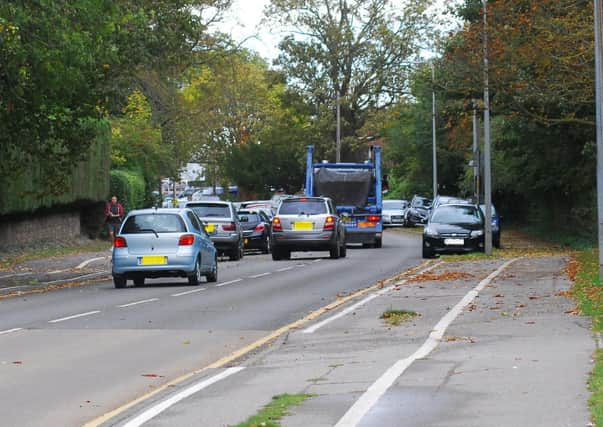New powers being considered to crack down on pavement parking


Transport Secretary Grant Shapps is seeking to make pavements safer for parents and disabled people and today announced he will look at options for a national pavement parking ban, with the assistance of local authorities.
The Government is set to consult on proposals in the summer designed to improve the lives of people with mobility or sight impairments, as well as parents with prams who may be forced into the road to get around parked cars.
Advertisement
Hide AdAdvertisement
Hide AdThe 12-week consultation will include options such as allowing local authorities with civil parking enforcement powers, such as Lincolnshire County Council, to crack down on unnecessary obstruction of the pavement. Currently, outside London, only police have this power.
The county council currently employs a network of wardens who enforce parking infringemnts on roads including double yellow lines, loading bays and school safety zones. It recently opted to increase the number of wardens after scrapping a CCTV camera car trial outside eight schools in the county including the William Alvey in Sleaford.
The government will also consider how a nationwide ban on pavement parking enforced by local authorities might work, allowing for any necessary exceptions or designated spots for pavement parking where needed, and how a tailored approach may be required in rural and suburban areas which face very different challenges.
There are a number of streets in the Sleaford area where residents complain about parking on pavements, particularly near schools where parents park to pick up their children. There have been complaints over recent years about parents parking on pavements near the William Alvey School.
Advertisement
Hide AdAdvertisement
Hide AdThere have also been complaints from bus companies about poor parking causing problems for bus routes on urban streets, as well as for dustbin lorries and emergency services.
Mr Shapps said: “Vehicles parked on the pavement can cause very real difficulties for many pedestrians.
“That’s why I am taking action to make pavements safer and I will be launching a consultation to find a long-term solution for this complex issue.
“We welcome the Transport Select Committee’s recent report and share their drive to tackle pavement parking and improve people’s daily lives.”
Advertisement
Hide AdAdvertisement
Hide AdIn 2019 the Department for Transport concluded a review which looked at the problems caused by pavement parking, the effectiveness of legislation, and the case for reform.
It found that pavement parking was problematic for 95 per cent of respondents who are visually impaired and 98 per cent of wheelchair users.
The Transport Select Committee also recently conducted an inquiry into the issue, with the commitment to consult on proposals forming a key part of the Government’s response to its findings.
Blanche Shackleton, head of policy, campaigns and public affairs at Guide Dogs, said: “Pavement parking prevents people with sight loss from getting out and about safely, resulting in feelings of loneliness and isolation.
Advertisement
Hide AdAdvertisement
Hide Ad“We look forward to working with the Government to make this proposed law a reality.”
Living Streets is part of the Walking and Cycling Alliance (WACA) with the Bicycle Association, British Cycling, Cycling UK, Ramblers and Sustrans.
Stephen Edwards, Director of Policy and Communications at Living Streets, said: “Pavement parking forces people with wheelchairs, buggies and those living with sight loss into the road and into oncoming traffic and the most vulnerable pedestrians continue to be put at risk of injury and isolation every day that this dangerous act continues.
“Clear pavements need clear laws, but currently regional differences cause confusion. We need a nationwide default ban, with the option to allow pavement parking in certain circumstances, as is currently available in London. This would be much simpler to enact and easier for everyone to understand.”
Advertisement
Hide AdAdvertisement
Hide AdThe Department is also looking at possible options to streamline and digitise the process used to create restrictions such as temporary road closures for roadworks, special events or permanent changes to speed limits and parking restrictions, known as ‘Traffic Regulation Orders’.
Research has shown a quarter of over 65s are prevented from leaving their home because of obstructed pavements, equating to nearly three million people. One in ten parents are put off walking their child to school because of cars parking on the pavements.
As the local parking enforcement authority, Lincolnshire County Councillr Richard Davies, executive member for highways, said: “We would welcome any further powers from the Government that will help us deal with dangerous and inconsiderate parking on our roads.
“However, any new measures need to be considered carefully to ensure new parking problems aren’t created whilst trying to rectify another one.”○ Tell us what you think of the idea of new pavement parking rules. Where is it a problem or have you had experiences of pavement parking problems locally? Email: [email protected] or call 01529 415981.